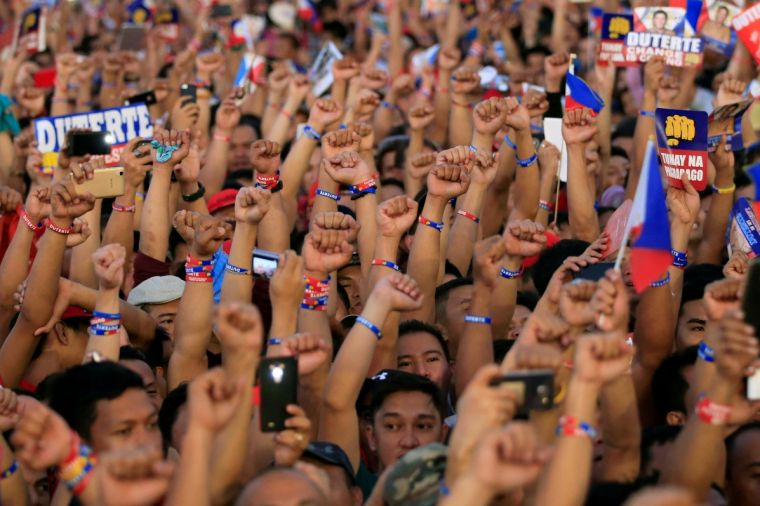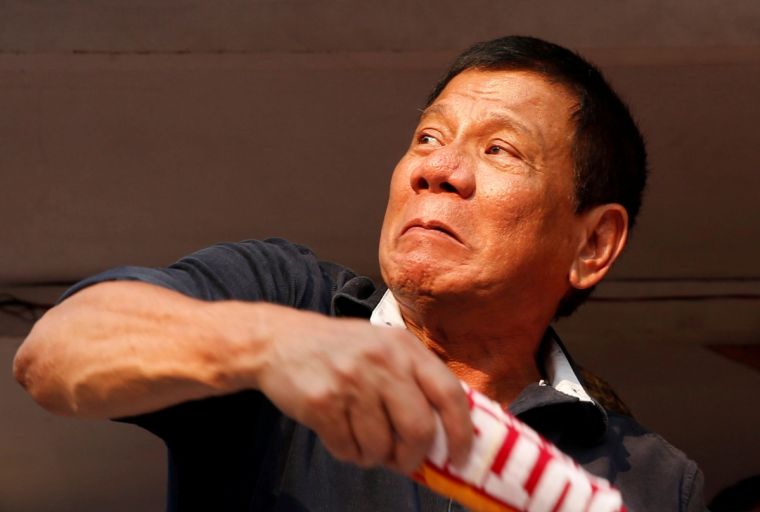Death squads and rape jokes: Why the Philippines' new president is no laughing matter

The Philippines claims to be the only Christian nation in Asia, with some justification. More than 80 per cent of its population is Roman Catholic. There are also lively Protestant churches, and Muslims too.
It's the Catholics who swing the demographic weight when it comes to elections, however. So you wouldn't think that a presidential candidate who calls their bishops "sons of whores" stood much chance of office.
Not so, however. President-elect Rodrigo Duterte used the expression in a rambling speech directed at Catholic bishops who had criticised his previous abuse, in the same terms, of Pope Francis (he was stuck in a traffic jam during the Pope's visit there). He also accused them of corruption, saying: "You ask so many favours, even from me." He added: "You know the most hypocritical institution? The Catholic Church."
When it comes to controversy, Duterte has form. The longtime mayor of Davao, he fought a campaign likened to that of Donald Trump in the US, smashing stereotypes, ignoring received wisdom about vote-winning behaviour and unashamedly playing for the populist vote.
While Duterte cultivates the same iconoclastic image as Trump, however, he is far less predictable and potential far more disruptive. He plans to bring back the death penalty. He has boasted of his links to death squads that killed more than 1,000 suspected criminals. On one occasion he personally forced a tourist to swallow his own cigarette butt in a local bar after the man refused to comply with an anti-smoking ordinance.
He was also criticised for saying about the rape of an Australian missionary who was raped and murdered in a prison where she was ministering in 1989, "Was I mad because she was raped? Yes, that's one of the reasons. But she really was beautiful. The mayor should have been first."

Duterte's relationship with religion has been conflicted. He says he was abused by a priest at his school, Mark Falvey, who died in 1975. He said in January 2016 that he had temporarily "forfeited" his religion: "If I obey the Ten Commandments or listen to priests, I would not be able to do anything as a mayor." However, he has a Protestant pastor friend and adviser, Apollo Quiboloy, who was a major supporter during his campaign. Quiboloy was reportedly hurt not to have been brought into Duterte's inner circle after his victory, but a Duterte spokesman denied there was a deliberate intention to offend him. Duterte himself said: "Let me be very clear, my friendship with my friends ends when the interest of the country begins. I would as much as possible make you happy if you are my friend, but I will not allow anybody to color my decisions in government. From now on it is always the interest of the Republic of the Philippines period."
Duterte has also accused priests and bishops of having children. Archbishop Oscar Cruz responded: "If he says that he knows of some bishops and priests with children...I think he should reveal them and give the proper evidence so that the church can do something about it."
Duterte's latest assault on the Church comes with an announcement that he intends to impose a three-child policy on families in an attempt to tackle over-population. "I'm a Christian, but I'm a realist so we have to do something with our overpopulation. I will defy the opinion or the belief of the Church," he said.
The Church is very worried. It's opposed to the reintroduction of the death penalty: "As people of faith, we do not adhere to capital punishment because we do not have the right to judge who should live and who should die," said Father Lito Jopson, head of the Catholic bishops' communications office. Of the proposed population control measures, Monsignor Oliver Mendoza, spokesman for the Archdiocese of Lingayen, whose head is the president of the Catholic Bishops Conference of the Philippines, said the would continue to speak against government policies that are contrary to Church teaching, "because if we fail to do that, if we close our eyes, if we close our lips, we close our ears, what will be the role of the Church?".
It's not just Roman Catholics, either: Episcopal Bishop Renato Abibico told Christian today he was very concerned about Duterte's human rights record. "With all his pronouncements of curbing criminality, corruption and others with an iron hand, I hope that he would also take seriously issues of human rights and due process," he said. "This nation has already seen so much of violence, extra-judicial killings and summary executions. Need we add more?"
While there are serious question marks over a Duterte presidency, his record is not a wholly negative one. As mayor of Davao he built a 24-hour drug rehabilitation centre. He offered a monthly allowance to drug users who approached him personally and offered to kick the habit. He has also been a hands-on advocate of peace negotiations with the long-running New People's Army revolutionaries and has led anti-discrimination legislation for Muslim and indigenous Lumad people.
However, he is not a Western liberal but a classic authoritarian strongman. What sort of president he will make is yet to be seen, but the Churches are gearing themselves up for challenging times.
Follow Mark Woods on Twitter: @RevMarkWoods











